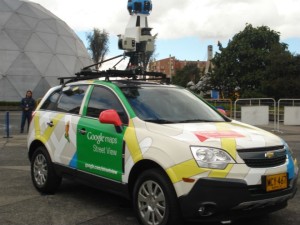 If you didn’t know by now Google Street View can show the whole world where you live and exactly what your home looks like. Yep; they can see those new drapes, the car in the driveway and the nicely manicured lawn you’re so proud of. Everybody can get a good look and I do mean everybody!
If you didn’t know by now Google Street View can show the whole world where you live and exactly what your home looks like. Yep; they can see those new drapes, the car in the driveway and the nicely manicured lawn you’re so proud of. Everybody can get a good look and I do mean everybody!
For some black people that might be a surprise. For others, maybe not. But black people happen to be a little more security conscious than others regardless of the neighborhood we live in.
Google Street View has become a privacy concern for many people. Not everyone wants the world to know what their home looks like or where they live. This is especially true for celebrities, pro athletes and other famous and infamous people. Others include people who may be escaping an abusive relationships. And these people have made their concerns known.
Google has felt the world’s wrath because of Street View. Investigations have been been launched in several countries where Google has introduced it’s Street View service. These investigations multiplied dramatically once it was discovered that Google was collecting Wi-Fi data in addition to digital images.
Google launched the Street View project in 2007. It immediately sparked numerous privacy concerns. Most of the debate about Street View revolved almost exclusively around the collection and display of images of homes and property obtained by the Google Street View digital cameras. These cameras are mounted on small vehicles that traveled the roads and highways. It was later determined that Google was also collecting a vast amount of Wi-Fi data from Wi-Fi receivers that were hidden in these vehicles. After several independent investigations, Google admitted that it gathered not only Wi-Fi data but MAC addresses (the unique device ID for Wi-Fi hotposts) and network SSIDs (the user-assigned network ID name) all tied to location information for private wireless networks. Google also admits that it intercepted and stored Wi-Fi transmission data including email passwords and email content.
Google ceased its illegal collection of Wi-Fi data transmissions after a global backlash. Google originally denied it was collecting Wi-Fi data but was was forced to admit it had collected the data including payload data. Payload data is the actual message in an email. Even then Google continued its denial claiming to have only collected “fragments” of such data. In the end Google acknowledged the collection of data saying, “in some instances entire emails and URLs were captured, as well as passwords.”
As of 2012, 12 nations have initiated investigations of Google’s practices. At least nine countries have found Google guilty of violating their laws.
Now for those of you who absolutely do not want the world to visit your home via the Internet you can remove your home from the Google site. The website welivesecurity.com has detailed instructions on how to remove your home from Google Street View.
Now you know.
